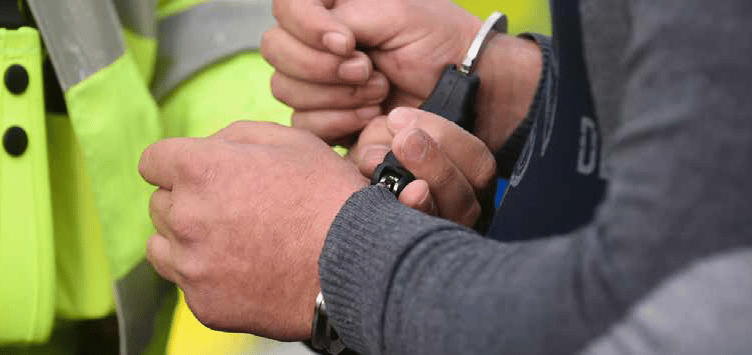ABUSE survivors and campaigners are calling for a ban on sex offenders changing their names to “escape authorities and their pasts.”
Last week, the Cambrian News reported on the case of Christian Taylor from, Rhydyfelin, who was handed 100 hours of unpaid work by Aberystwyth magistrates for breaching the terms of the sex offenders register by failing to notify police before he travelled abroad.
The Cambrian News can now reveal that Christian Taylor changed his name from Christopher Wood after the former teacher was jailed in 2017 and added to the sex offenders’ register for sending a girl at the school where he taught in Solihull, West Midlands naked photographs of himself with his genitals obscured by an emoji.
The now 39-year-old sent the youngster images of himself being given oral sex and having sex with a previous partner.
He was convicted of inciting a child to engage in sexual activity whilst in a position of trust.
He was jailed for 15 months and placed on the sex offenders register for 10 years, with the judge telling him “your life is in ruins”.
Following his conviction however, Wood has obscured his identity, switching to Christian Jarvis Taylor and moving into the flat in Rhydyfelin.

Campaigners The Safeguarding Alliance have called the ability for “sex offenders to change their name by deed poll and go under the radar of all authorities”, a “serious safeguarding loophole.”
“Our research found that the existing laws are enabling offenders to work around the system, free to obscure their identity without being monitored,” they said.
“The work demonstrates that there needs to be a joined-up approach between statutory and other agencies.”
The Alliance argues that the current name change process is “too simple, inexpensive and unregulated”, and has called for a public inquiry into the issue.
The need to close the loophole was discussed in the House of Commons last week, and the Home Office carried out two related reviews of the issue last year but has not published the findings from either exercise.
Figures from the BBC Shared Data Unit show that throughout England and Wales over the past three years to 2022, at least 729 sex offenders were recorded by police as having gone missing or wanted for arrest.
The data show almost 1,500 registered sex offenders notified police forces of lawful name changes.
A total of 2,190 criminal records checks by the Disclosure & Barring Service flagged up both the applicants had cautions or convictions and that they had supplied incorrect or missed out personal details such as past names or aliases.
The data show there had been more than 5,500 offences committed by sex offenders of failing to comply with notification requirements such as living in a household with a child. Nearly 6,750 prosecutions had begun for offences by registered sex offenders of breaches of a sexual harm prevention order/interim order/foreign travel order.
In north Wales, the police force recorded 28 instances between 2019 and 2022 of registered sex offenders notifying them of a change of name.
Dyfed-Powys Police did not provide that information.
In north Wales, 13 criminal record checks were carried out over the three years that revealed incorrect or missing personal details. -
In Dyfed-Powys that figure was 17.
In Dyfed-Powys, 75 sex offenders were prosecuted for breaching terms of the register between 2019 and 2022, including foreign travel orders.
In north Wales, 118 were prosecuted for breaches.
In north Wales, figures show that seven sex offenders “went missing” from the force area with their current whereabouts unknown, but none in Dyfed-Powys.
Scottish Conservative shadow community safety minister Russell Findlay MSP, has also called for legal changes in the Scottish Parliament to prevent registered sex offenders changing their names, while Independent TD Denis Naughten raised similar concerns with Northern Ireland Justice Minister Helen McEntee during a committee last year.
A petition in 2021 calling on the UK Government to “revoke the right of registered sex offenders to change their name by deed poll”, garnered almost 40,000 signatures.
In response, a UK Government spokesperson said: “We understand concern about offenders attempting to hide their identity and are working with Courts and Disclosure and Barring Service to close any monitoring gaps to ensure the public is kept safe.”

Police dealing with more registered offenders
There are more than 1,600 rex offenders living in the areas covered by the North Wales and Dyfed-Powys police services. And the number has increased over the past three years, new figures show.
Police forces, probation services and other government agencies supervise and keep track of sex offenders and violent criminals in communities across England and Wales through multi-agency public protection arrangements — MAPPAs.
Data from the Ministry of Justice shows 587 people convicted of sex crimes were being managed under MAPPAs in the Dyfed and Powys policing area at the end of March 2022.
That number was up from 562 the year previous year.
There were also 121 violent offenders and nine other dangerous offenders under the arrangements in the area.
The Justice data shows 1,019 people convicted of sex crimes were being managed under MAPPAs in the North Wales up to March 2022, and that figure was up 1,006 in 2021.
In 2020, there were 1,004 sex offenders in the area, and 946 in 2020.
Name changes by registered sex offenders
Campaigners' concerns
- The process by which a registered sex offender can change their name by deed poll, both enrolled and unenrolled is far too simple, inexpensive and unregulated, according to the Safeguarding Alliance, a group that campaigns for more oversight of sex offenders.
- An offender can change their name, from prison or elsewhere, at minimal or no cost and commence the process of obscuring their identity unmonitored.
- The Sexual Offences Act 2003 places the onus of reporting a name-change on the registered sex offender. This is a legal loophole rendering reporting unreliable and resulting in sex offenders avoiding slipping under the radar of all authorities.
- There is no joined-up approach between statutory and other agencies. As a result, the effectiveness of important legislation, the Sex Offenders Register and the Child Sex Offender Disclosure Scheme and Domestic Violence Disclosure Scheme are being undermined and rendered redundant.
According to the data, there were also 218 violent offenders and seven other dangerous offenders under the arrangements in the North Wales area.
Nationally, 66,741 sex offenders were on MAPPAs in 2022, up 4 per cent on 2021 and up 65 per cent from ten years ago.
The rate of sex offenders among the population was 126 per 100,000 when the data was collated.
A Ministry of Justice spokesperson said: “The number of sex offenders being monitored increases every year as many are put on the sex offenders register for life when they are convicted.”
There were 22,304 violent offenders and 393 other dangerous offenders under MAPPAs across England and Wales at the end of March.
Dyfed-Powys has seen the number of sex offenders increase from 514 in 2020 and 494 in 2019, with sex offenders making up 82 per cent of those being managed through MAPPAs in the area in 2022.
There were also 121 violent offenders and nine other dangerous offenders under the arrangements in the area.
The Ministry of Justice recorded a significant jump in sexual harm prevention orders – SHPOs — in 2022, which coincided with a 57 per cent increase in the number of people convicted of sexual offences in 2020-21 following the relaxation of Covid-19 restrictions on courts.
SHPOs are applied when the court believes a protection order is needed to protect the public from sexual harm and can include a ban on foreign travel to protect children from sexual harm abroad.
A total of 5,753 SHPOs were handed down nationally in the year to March – up 33 per cent from 4,325 in 2020-21. Of these, 69 were imposed on offenders in Dyfed and Powys last year
75SPHOs were imposed on offenders in North Wales over the same timeframe.
Key takeaways
- MAPPAs are multi-agency public protection arrangements that allow police forces, probation services and other government agencies supervise and keep track of sex offenders and violent criminals.
There are three categories of MAPPAs.
- Category One: All Registered Sexual Offenders.
- Category Two: Violent or other sex offenders not subject to notification requirements.
- Category Three: Other dangerous offenders.
- SHPOs are sexual harm prevention orders — applied when the court believes a protection order is needed to protect the public from sexual harm and can include a ban on foreign travel to protect children from sexual harm abroad.
- 218 violent offenders are living under MAPPAs in north Wales, according to Ministry of Justice data for 2022
- 121 violent offenders are living under MAPPAs in Dyfed-Powys, according to Ministry of Justice data for 2022
A Home Office spokesperson added they are pleased to see police using SPHOs to target people responsible for “horrific abuse”.
“We have some of the toughest powers in the world to deal with sex offenders, and those that pose a risk of sexual harm, to ensure the public is protected,” the spokesperson said.
Rachel Almeida, Victim Support assistant director of knowledge and insight, said the charity is “extremely worried” about an increase in sexual violence”– and particularly rape – being reported to police nationally.
She said it comes in the context of “poor conviction rates and horrendous court delays”.
Ms Almedia added: “It is vital that these reports are taken seriously and that the justice system has the resources to ensure that victims get the care, support and protection they need – and that justice is served.”

.png?width=209&height=140&crop=209:145,smart&quality=75)



Comments
This article has no comments yet. Be the first to leave a comment.